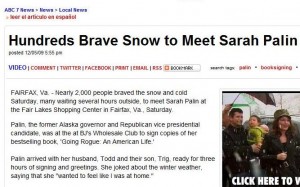You know, you wouldn’t think it would cost that much to hire an editor or a proofreader — my 16 year old son. True, son, and if we’re spreading truths then the fact is your old man can use one almost every day. I’m not quite the King of Typos, but I am the Emperor of Dropped or Wrong Words. Then again, I write a blog for Silver Beacon Marketing’s clients and the people who pass by, not as the representative of a major market television affiliate.
There were big doings here in the DC area yesterday. You see, it snowed three inches at Dulles Airport, just a few miles from my house. Had this been a Monday rather than a Saturday, the federal government would have invoked its liberal leave policy, and hundreds of thousands of schoolchildren would have joined my son in sleeping late. But it was a Saturday, which meant those same people who watched the monster three inches bear down on Dulles also braved the storm to go to the B.J.’s Wholesale Club that’s certainly within sled dog distance to see Sarah Palin.
Our nation’s culture of celebrity meant that the district that overwhelmingly rejected Ms. Palin and Senator McCain’s candidacy showed up in the snow with copies of a book for her to sign. (The greedy opportunists probably have it on eBay now, and had I not been doing an SEO audit yesterday, I think I may have done the same.)
But my son Jared nailed the real issue behind today’s headlines and he even spotted why an editor was needed. You see, editors are filters. I deliberately wrote this blog with a heavily slanted voice, allowing more of my own voice to creep in to the writing than any professional journalist should allow. When I asked Jared why he thought the headline and lead on the WJLA-TV site was inconsistent, he said, “I’m guessing someone doesn’t like her very much.” Then he pointed a typo in the last sentence’s introductory clause. He certainly has Mom’s proofreading skills. But if all of this nitpicking on the local ABC affiliate (story below) is a lighthearted Sunday rant, the fact is that as newsroom budgets get cut and mainstream media resources are stretched, you’ll see more of “hundreds” in the headlines and “thousands” in the text as a writer talks about braving what was then a solid inch of snow. As my son says, the least you could expect from an ABC affiliate is that they had enough money to hire an editor. You see, editors are filters, and we need more of them everywhere.

